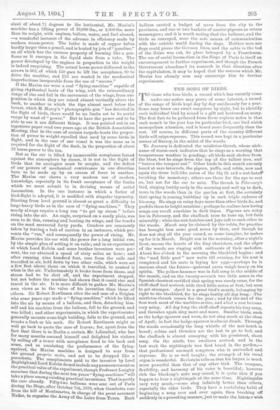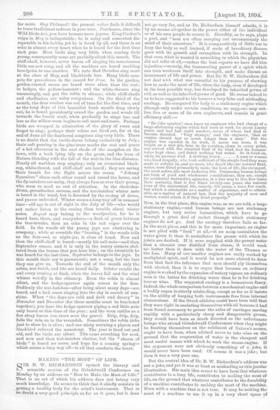THE SONG OF BIRDS.
TO those who love birds, a record which has recently come under our notice may prove of some interest, a record of the songs of birds kept day by day assiduously for a year. Some may know our sweet songsters by sight, but to identify
each individual bird by sound is a gift not bestowed on many.
The first fact to be gathered from those copious notes is that each month in the year has its particular bird, one bird which monopolises attention, and is heard more frequently than the rest. Of course, in different parts of the country different birds will reign supreme. This record was kept in a particular corner of Surrey, in the midst of the woods. The first fact to be gathered from those copious notes is that each month in the year has its particular bird, one bird which monopolises attention, and is heard more frequently than the rest. Of course, in different parts of the country different birds will reign supreme. This record was kept in a particular corner of Surrey, in the midst of the woods.
To Tanuary is dedicated the mistletoe-thrush, whose nick- name of storm-cook indicates that he sings as a warning that tempestuous weather is pending; all birds seek shelter from the blast, but he sings from the top of the tallest tree, and " braves the tempest out." Other birds in this month are only heard at rare intervals, the pigeon, yaffie, and robin, now and again the three bell-like notes of the big tit and a nut.liatclf breaking the monotony; others are there for the eye to rest on, but not for the ear to note. The thrush is February's bird, singing lustily early in the morning and well up to dark, more in the woods than in the garden at first, the certainty that spring is coming bubbling up in each triple cadence of his song. He sings on rainy days more than other birds do, and prefeii them to bright sunshine ; perhaps he realises how loving songs can recall sunshine in dark times. Pigeons are noisy too in February, and the chaffinch tries to tune up, but fails miserably ; while the nut-hatches and jays call to each other in the woods. March may be claimed by the robin, for practice has brought him some good notes by then, and though he does not sing all the year round, as some imagine, he makes up for it in March. Bright sun in the morning, after a night's frost, warms the hearts of the tiny choristers, and the edges of the woods are ringing with outbursts of their melodies. About fire o'clock in the morning the blackbird begins ; and the "mad little poet" now waits till evening, for his nest is completed and his mate is laying her eggs—perhaps he is anxious about the future—paternal cares weigh heavy on his spirits. The yellow-hammer was in full song in the middle of the month, and on the twenty-seventh two little notes in the Spanish chestnut certified that spring was surely come, for the chiff-ohaff had arrived, with tired little notes at first, but soon to get stronger. April is a great bird's month, belonging by right to the blackbird, for he sings lustily all day long. The mistletoe-thrush ceases for the year ; and by the end of the first week most of the warblers arrive, and after a rest become very noisy. All day long the chill-chaff repeats his tiny song, and thrushes again sing more and more. Smaller birds, such as the hedge-sparrow and wren, do not sing much at the close of April; in fact the hedge-sparrow is almost dumb. Through the woods occasionally the long whistle of the nut-hatch is heard ; robins and thrushes are the last to go to bed, and the chaffinch is almost annoying with his persistent, short song. On the nintb, two swallows arrived, and in the last week the nightingale was first beard in the garden,— that professional amongst songsters who is unrivalled and supreme. He is so well taught; the strength of his vocal organ is wonderful. Bechstein tells us that his larynx is much more powerful than that of any other bird. The compass, flexibility, and harmony of his voice is beautiful; however rich the blitekcap's note may sound, it is quite thin if you happen to hear a nightingale at the same time. Nightingales vary very much,—some sing infinitely better than others, especially the older birds. They have a tantalising habit of beginning a song over and over again, then breaking off suddenly in a provoking manner, just to make the listener wish for more. Gay Philomel 1 the present writer finds it difficult to trace traditional sadness in your tone. Perchance, since the Wild Birds Act, you have become more joyous. King Cuckoo's reign in May is indisputable ; he is noisy and somewhat dis- reputable in his habits, yet he is loved by all, and there is an echo in almost every heart when he is heard for the first time each year. Most birds sing very little when rearing their young, consequently some are partially silent this month. The chill-chaff, however, never leaves off singing his monotonous little see-saw song, and all the warblers are heard warbling love-lyrics to one another. We note that thrushes sing more at the close of May, and blackbirds less. Many birds com- pete for precedence in the record for June. In the garden, golden-crested wrens are heard more often than the rest; in hedges, the yellow-hammer ; and the white-throats sing unceasingly, and put the robin to silence ; while chill-chaffs and chaffinches are noisy everywhere. On the third of the month, the dear cuckoo was out of tune for the first time, and as the long days of this beautiful fresh month drag slowly ont, he is heard persistently round the garden and woods till towards the fourth week, when gradually he sings less and less as the willow-wren begins to call more and more. Perhaps birds are wrapped in admiration of the glory of roses and forget to sing ; perhaps their voices are tired out, for at the end of June all the feathered songsters sing very little. There is no doubt that the turtle-doves belong exclusively to July ; their soft purring in the pine-trees marks the rest and peace of a hot afternoon in the cool shade of the mespilus on the lawn, with a book lying idly on the grass, and the hum of Nature blending with the fall of the weir in the blue distance. Nearly all warblers stop singing ; only an occasional black- cap, white-throat, and chiff-chaff are heard ; they are saving their breath for the flight across the ocean. " Johnny Squealers" chase each other round and round the house, and the fly-catchers are noisy, they always fuss so over their young, who seem to need no end of attention. In the rhododen- drons, greenfinobes scream, and the nut-hatches' winter note is heard in the wood, but is drowned by the cooing of doves, and passes unheeded. Winter seems a long way off in summer time—old age is out of sight in the July of life—who would not rather listen to the cooing than trouble about winter notes. August may belong to the woodpecker, for he is heard here, there, and everywhere,—a flash of green between the tree-trunks, then an echo in the oak copse over the field. In the woods all the young jays are chattering in company ; while at eventide the " burring " in the woods tells us the fern-owl, or night-jar, is close at hand. Now and then the cliff-chaff is heard—mostly his call-note—and then September comes, and it is only in the sunny corners shel- tered from the breeze that you hear him ; on the twentieth he was heard for the last time. September belongs to the jays. In this month their cry is paramount; not a song, but the best they can give us. Towards the end of the month only the robin, nut-hatch, and tits are heard daily. October recalls the owl every evening at dusk, when the leaves fall and the wind whines weirdly in the chimney. Even the robin is almost silent, and the hedge-sparrow again comes to the fore. Suddenly the nut-hatches—after being silent many days—are heard, and a lark soars singing into the sky in search of sun- shine. When "the days are cold and dark and dreary" in November and December (for these months must be bracketed together), you hear the hedge-sparrow piping a sad little note only heard at this time of the year ; and the wren rattles as a few stray leaves run races over the gravel. Drip, drip, drip, falls the rain on to the verandah. Sometimes the robin ticks just to show he is alive ; and one misty morning a pigeon and blackbird relieved the monotony. The year is tired out and old, and the birds are silent. Tits come searching for seed, and now and then nut-hatches chatter, but the "charm of birds " is heard no more, and hope for a coming spring— which seems a long way off—is all that comforts the heart.



































 Previous page
Previous page